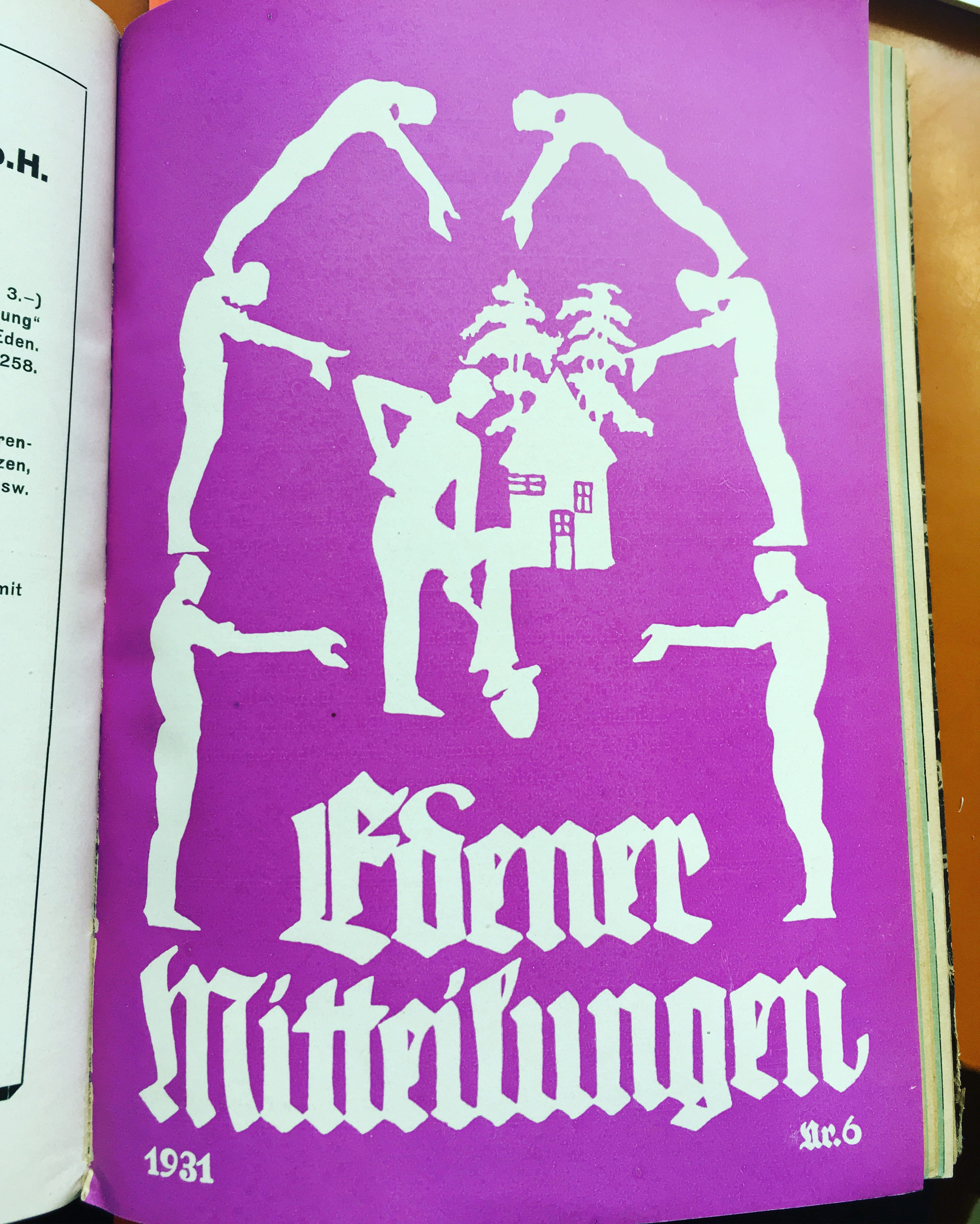by contributing editor Carolyn Taratko
“Vegetarianism is not only a question of the stomach but also one of society.” This may sound familiar to readers, as articles such as “Eat less meat to avoid dangerous global warming, scientists say” grace our newsfeeds and remind us of the environmental consequences of meat consumption. In fact, this quote comes not from a recent Guardian article but from Hermann Krecke, an advocate of a vegetarian lifestyle and member of the Eden Cooperative Fruit Settlement outside of Berlin around the turn of the twentieth century. Nineteenth-century vegetarianism represented the first popular wave of the movement, with an especially substantial following in Germany. Adherents share some key attributes with what we would recognize as vegetarianism today, but the two also differ in significant ways. While today vegetarianism is regarded as a dietary preference, historically it was associated with a certain worldview. I hesitate to trace a direct line of continuity between contemporary vegetarians and their nineteenth-century antecedents: the group has always been a heterogeneous one, perhaps best defined by a commonly held conviction that reform of society begins with the individual. These differences aside, it does appear that the larger social implications of dietary choices have circled back into contemporary consciousness.

Cover of Edener Mitteilungen, journal of Eden Settlement, 1931
Instead of an ethical imperative concerned with climate change, or even animal welfare, vegetarianism as practiced in nineteenth-century Germany took up the problem of social relations among humans. While an aversion towards the slaughter of animals was frequently cited as one justification for renouncing meat and adopting a vegetarian lifestyle, it was actually secondary to a group that saw itself as an association of modern practitioners of ascetism and remained skeptical of the increasingly visible manifestations of large industry and capitalism. These troubling developments catalyzed a turn inwards among members, who aimed to reform themselves without waiting for social norms or laws to change. At the Eden Settlement, founded in 1893 and perhaps the most well-known among the communities, the three doctrinal pillars, depicted in the form of three hardy trees on their crest, signified a sort of holy trinity of reform goals: reform of self, reform of land (Bodenreform), and reform of the economy. With that approach, German vegetarians hoped to alleviate some of the problems related to poverty.
Beginning in the late eighteenth century with the decline of the old corporate social structure, it became fashionable for middle-class individuals (primarily men) to organize in forms of associational life through the structure of the Verein. As Thomas Nipperdey has noted, the number of associations in Germany exploded between the late eighteenth and late nineteenth centuries. It was during this time that the first vegetarian association formed. While the earliest associations crystallized around general interests (for example, an interest in reading or patriotism), over time the trend skewed towards a greater degree of specialization. Amid the proliferation of associations for singing, education, and social reform, the Verein für naturgemäße Lebensweise (roughly “the association for a natural lifestyle”) was founded in the 1860s by a cohort of committed vegetarians. The association popularized a “natural lifestyle” which involved abstention from meat. In 1892, it was renamed as the Deutschen Vegetarier Bund, thus putting the avoidance of the meat at the center of their identity as a group.
Yet what was originally called a “vegetarian lifestyle” was not self-evidently a meat-free diet. Eva Barlösius has convincingly argued that membership in the Verein (and later, the Bund) was not about a specific diet, nor was it narrowly about abstention from eating meat. Instead of representing a core tenet of common belief, a meat-free diet was merely one strategy for communicating difference between members and non-members (Barlösius, 11). Members advocated abstention from alcohol and tobacco as well as meat; a “natural lifestyle” entailed a good deal more than a plant-based diet. Writings from early practitioners, including Gustav Struve and Theodor Hahn, focused on a life of introspection and simple, coarse clothing, as well as natural cures in addition to a plant-based diet. As Barlösius notes, avoiding meat was one practice that both distinguished and united members of a group who often had differing agendas.

Gustav Struve
On the other hand, such a strict focus on social distinction and the social structure of the association as Barlösius presents obscures the ideological and scientific bases of the movement. The development of nutritional science increasingly thrust meat into national debates about health and the “social problem.” In the first place, food safety came to the fore on the international stage. Uwe Spiekermann has highlighted the role of pork as a contentious issue in relations between the US and Germany from 1870-1900, as food inspection became professionalized in the wake of trichinosis outbreaks on both sides of the Atlantic. This was an oft-cited reason given by vegetarians, such as leading figure Struve in his 1869 publication Pflanzenkost, die Grundlage einer neuen Weltanschauung. While disease outbreaks presented one risk inherent in a meat-laden diet, another took the form of more pronounced economic disadvantage. The growth in meat consumption and production was regarded by some as a source of continuing pauperization and undernourishment. According to one calculation, annual per capita meat production in 1855 was 19.6 kg. By 1895 this figure had practically doubled; by 1914 it had reached 45 kg. Several prominent experts (Max Weber among them) regarded the shift in dietary preferences and resulting undernourishment, or nutritional “gap” as they called it, to be the origin of alcoholism and the abuse of spirits among the working class. All in all, the growing presence of meat at the table was one noticeable sign of the changing times.
Continued speculation about the influence of diet on the character of man flourished among the vegetarians. In echoes of the materialist debates of midcentury, when Feuerbach published his now famous dictum “Der Mensch ist was er isst” (Man is what he eats) in a review of Jacob Moleschott’s work, vegetarians argued that meat consumption predisposed humans to a fiery temperament, not least because the act of killing was part and parcel of meat production. While the vulgar materialism of Moleschott (which held that thought and emotion had a material basis that could be found quite literally in food) had been rejected by orthodox scientists, variations of it lived on. The association of meat with an excess of energy, both violent and sexual, appears frequently in contemporary journals. Some, such as Struve, cited the improved temperament of vegetarians and drew the conclusion that war would become impossible among nations of plant-eaters. It became increasingly difficult to socialize in such spheres without sharing the opinion that meat was a moral and social ill in modern Germany.
Today, since awareness of the carbon emissions of livestock rearing has become mainstream, we have a new, climactic justification for vegetarianism. This line of reasoning holds that we in the west who are fortunate to have such a wide selection in our diets should choose wisely. According to the climate vegetarians, choosing wisely is not only a matter of personal health, but also involves a calculus for the welfare of the planet and for others in less advantaged regions, especially the global South, where climate change has and will strike with particular vengeance. The climactic justification for a vegetarian diet in some ways resembles that of the turn–of-the-century vegetarians in Germany, who saw their choices in nourishment not only as an individual dietary choice, but an ethical commitment to mankind.



2 Pingbacks